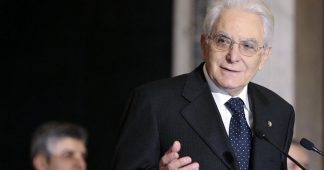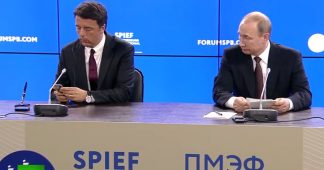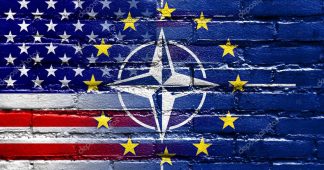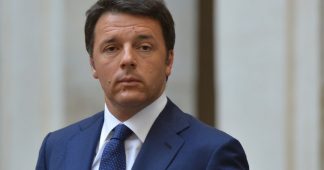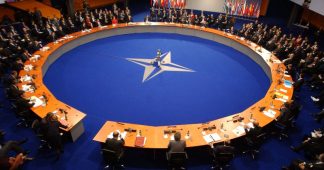Since the time of Silvio Berlusconi, Italy has been attempting to draw closer to Russia, with which it has several common interests. However, the promise of marriage has never yet led to any important concrete measures, because Italy is a member of NATO, and as such, is obliged to be an enemy of Russia.
by Manlio Dinucci
30 October 2018
« I consider it very important for us to meet a strategic partner like the Federation of Russia, and also necessary, in order to work out solutions to the main regional crises » – such was the statement by Prime Minister Giuseppe Conte at the joint Press conference following his meeting with Vladimir Putin on 24 October in Moscow. A fundamental question which has to be resolved, he emphasised, is « the crisis in Ukraine, which has provoked discussion about the basis of the relations between the European Union and Russia ». But, « despite the persistence of the reasons that led to the European sanctions, an instrument which must be abandoned as soon as possible », the bilateral relationship between Italy and Russia remains « excellent ».
These declarations bring to mind those of Prime Minister Matteo Renzi during a round table with President Putin in Saint Petersbourg in 2016 : « The term Cold War is now absent from History and also from reality. The EU and Russia should be excellent neighbours ». These declarations were borrowed by diplomats and amplified by Moscow, in an attempt to reduce tension : « Conte in Moscow, the alliance with Russia is stronger than ever », was the 25 October headline of the Russian Press agency Sputnik, which spoke of a « 360-degree visit ». In reality, it was a 180-degree visit, because Conte (like Renzi in 2016) presented himself as the head of a member state of the European Union, and restricted his visit to economic agreements with Russia. The Prime Minister avoided mentioning the fact that Italy is a member of NATO, under command of the United States, a country that Conte’s government considers as a « privileged ally », with which he has established « a strategic cooperation, almost a twin partnership ».
Thus, at the table with Italy and Russia was seated the Stone Guest, the « privileged ally » closely followed by Italy. So nothing was said about the fact that on 25 October – the day after Prime Minister Conte, in Moscow, had qualified the state of bilateral relations between Italy and Russia as « excellent » – Italian armed forces began the war game Trident Juncture 2018 with other NATO forces, under US command, and directed against Russia. This an exercise in which the US and NATO bases in Italy play a major part. There was no mention either of the fact that on 25 October – the day after Prime Minister Conte, in Moscow, had qualified Russia as a « strategic partner », his government, in Brussels, participated in the North Atlantic Council which, on the basis of « information » supplied by the USA, unanimously accused Russia of violating the INF Treaty with « behaviour destabilising for our security ».
The Conte government thus supported de facto the US plan to abandon the INF Treaty and once again to deploy in Europe (including Italy) medium range nuclear missiles pointed at Russia. These missiles will be added to the new B61-12 nuclear bombs that the United States will begin to deploy, as from March 2020, in Italy, Germany, Belgium, Holland and probably other European countries, always with an anti-Russia objective.
At the Press conference, responding to a journalist, Putin was very clear – the European countries which accept to deploy US medium range nuclear missiles on their territory would be endangering their own security, because Russia would be ready to riposte. Conte assured that « Italy lives with the anxiety of this conflict and will do everything possible to ensure that a window for dialogue remains open ».
One supposes that this is what he is doing – by preparing to house and use, under US command, the new B61-12 nuclear bunker-buster bombs to destroy Russian underground facilities and command centres.
Translation Pete Kimberley
Source Il Manifesto (Italy)
* Manlio Dinucci: Geographer and geopolitical scientist. His latest books are Laboratorio di geografia, Zanichelli 2014 ; Diario di viaggio, Zanichelli 2017 ; L’arte della guerra / Annali della strategia Usa/Nato 1990-2016, Zambon 2016. Guerra nucleare. Il giorno prima. Da Hiroshima a oggi: chi e come ci porta alla catastrofe, Zambon 2017; Diario di guerra. Escalation verso la catastrofe (2016 – 2018), Asterios Editores 2018.
